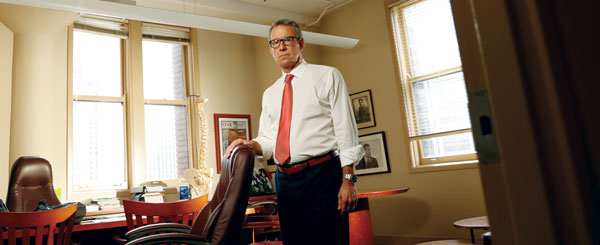Lawsuits fail to bring improvements to nursing homes
While state fines do little to bring meaningful change to the nursing home industry, litigation against the homes doesn’t help spark improvements, either.Most civil lawsuits against nursing homes settle, according to health care attorneys, who say the agreements are often limited to monetary awards and include plaintiff confidentiality clauses that keep potentially damaging information out of public view.
“I have seen some settlements that included equitable relief, but the tort system is typically not about anything other than money,” says David Hoffman, a former federal prosecutor who handled health care fraud and abuse cases. Based in Philadelphia, he now does regulatory compliance consulting with nursing homes.
“If someone could point out to me how personal-injury cases against nursing homes routinely improve care for everybody else, I would feel much better about it, but I do not see that,” Hoffman adds. “What I see are litigants fighting about the care that was rendered; and very rarely do I see creative settlements, where the remedy was not only about money but also included care delivery system monitoring.”
And thus, many nursing homes are sued over and over again.

Chicago defense lawyer Terrence Carden sees nursing homes as good money-makers for plaintiffs lawyers. Photographs by Wayne Slezak.
Floyd Schlossberg, owner of the Alden Wentworth nursing home in Chicago, owns 27 Illinois nursing homes and is no stranger to such lawsuits. Between 2010 and 2014, his facilities received 51 civil money penalties for state deficiency statement findings. During that same time, the nursing homes were named as defendants in 212 lawsuits in the Circuit Court of Cook County. The majority of the lawsuits involved personal-injury claims.
The Alden Network, which manages Schlossberg’s nursing homes, did not respond to numerous interview requests from the ABA Journal.
Terrence S. Carden III, a Chicago defense lawyer, says nursing homes are good moneymakers for Illinois plaintiffs lawyers. He recalls an Edwardsville, Illinois, case that resulted in a jury award of $58,000 to the plaintiff. The trial court approved $175,000 in attorney fees, and the award was upheld by an Illinois appellate court.
“Plaintiff lawyers know from a practical standpoint that there’s rarely going to be a no-offer case,” Carden says. “That’s why you see so many television ads for nursing home lawsuits.”
However, working up a nursing home case is not cheap. Costs can exceed $100,000, and in Cook County the pretrial phase may last up to four years, according to Steve Levin, a partner with Chicago’s Levin & Perconti who frequently files suits against nursing homes.
It’s also difficult to determine a nursing home’s actual assets. Someone who owns more than one will frequently set up each nursing home as its own corporation. Additional corporations are often set up for each piece of real estate owned, as well as for facility medical equipment.

Chicago plaintiffs lawyer Steve Levin says working up a nursing home case is not cheap, costing up to $100,000.
Separate companies also are set up by nursing home owners to handle management, housekeeping and food service, says Ruqaiijah Yearby, a professor and associate dean of institutional diversity and inclusiveness at Case Western Reserve University School of Law.
“The owner will then pay a lot of money to these companies that they own, taking out the money for themselves and not putting it back into nursing care,” says Yearby, who previously was an assistant regional counsel with the U.S. Department of Health and Human Services, which oversees the Centers for Medicare & Medicaid Services.
“It’s almost as though the nursing home is deciding how much liability they want you to have,” says Wendy Meltzer, executive director of Illinois Citizens for Better Care, an advocacy group for long-term-care residents.
In terms of specific insurance coverage, nursing home policies vary greatly, says Carden, a partner with Myers Carden & Sax. Some choose to go without, and they create funds to stand in place of insurance. Illinois has a long backlog of Medicaid payments, he says, which is one reason facilities there forgo insurance.
Levin, who has been suing nursing homes for 30 years, says that he’s seen only one nursing home file for bankruptcy protection. His settlements, he adds, are often larger than a facility’s insurance policy limit.
“You just have to be extremely persistent and willing to do whatever is necessary to collect the judgment,” Levin says. “So at the end of the day when the other side tells you that they don’t have any insurance or any money, we say, ‘That’s your problem, not ours.’”
See related feature: “Fines against unsafe nursing homes are considered a slap on the wrist.”
This article originally appeared in the August 2016 issue of the ABA Journal.
Write a letter to the editor, share a story tip or update, or report an error.


